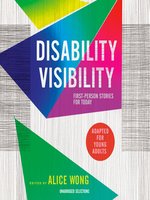by Alice Wong
The eye-opening essays in Disability Visibility, all written by disabled people, offer keen insight into the complex and rich disability experience, examining life's ableism and inequality, its challenges and losses, and celebrating its wisdom, passion, and joy.
The accounts in this collection, adapted for audio, ask readers to think about disabled people not as individuals who need to be “fixed,” but as members of a community with its own history, culture, and movements. They offer diverse perspectives that speak to past, present, and future generations. It is essential listening for all.
This audiobook contains unabridged selections from Disability Visibility (Adapted for Young Adults).
Audiobook Table of Contents:
If You Can’t Fast, Give by Maysoon Zayid
There’s a Mathematical Equation That Proves I’m Ugly—or So I Learned in My Seventh-Grade Art Class by Ariel Henley
When You Are Waiting to Be Healed by June Eric-Udorie
The Isolation of Being Deaf in Prison by Jeremy Woody, as told to Christie Thompson
We Can’t Go Back by Ricardo T. Thornton Sr.
Guide Dogs Don’t Lead Blind People. We Wander as One. by Haben Girma
Canfei to Canji: The Freedom of Being Loud by Sandy Ho
Nurturing Black Disabled Joy by Keah Brown
Selma Blair Became a Disabled Icon Overnight by Zipporah Arielle
So. Not. Broken. by Alice Sheppard
Incontinence Is a Public Health Issue—and We Need to Talk About It by Mari Ramsawakh
Falling/Burning: Being a Bipolar Creator by Shoshana Kessock
Gaining Power Through Communication Access by Lateef McLeod
The Fearless Benjamin Lay: Activist, Abolitionist, Dwarf Person by Eugene Grant
On the Ancestral Plane: Crip Hand-Me-Downs and the Legacy of Our Movements by Stacey Milbern
The Beauty of Spaces Created for and by Disabled People by s.e. smith
The eye-opening essays in Disability Visibility, all written by disabled people, offer keen insight into the complex and rich disability experience, examining life's ableism and inequality, its challenges and losses, and celebrating its wisdom, passion, and joy.
The accounts in this collection, adapted for audio, ask readers to think about disabled people not as individuals who need to be “fixed,” but as members of a community with its own history, culture, and movements. They offer diverse perspectives that speak to past, present, and future generations. It is essential listening for all.
This audiobook contains unabridged selections from Disability Visibility (Adapted for Young Adults).
Audiobook Table of Contents:
If You Can’t Fast, Give by Maysoon Zayid
There’s a Mathematical Equation That Proves I’m Ugly—or So I Learned in My Seventh-Grade Art Class by Ariel Henley
When You Are Waiting to Be Healed by June Eric-Udorie
The Isolation of Being Deaf in Prison by Jeremy Woody, as told to Christie Thompson
We Can’t Go Back by Ricardo T. Thornton Sr.
Guide Dogs Don’t Lead Blind People. We Wander as One. by Haben Girma
Canfei to Canji: The Freedom of Being Loud by Sandy Ho
Nurturing Black Disabled Joy by Keah Brown
Selma Blair Became a Disabled Icon Overnight by Zipporah Arielle
So. Not. Broken. by Alice Sheppard
Incontinence Is a Public Health Issue—and We Need to Talk About It by Mari Ramsawakh
Falling/Burning: Being a Bipolar Creator by Shoshana Kessock
Gaining Power Through Communication Access by Lateef McLeod
The Fearless Benjamin Lay: Activist, Abolitionist, Dwarf Person by Eugene Grant
On the Ancestral Plane: Crip Hand-Me-Downs and the Legacy of Our Movements by Stacey Milbern
The Beauty of Spaces Created for and by Disabled People by s.e. smith





